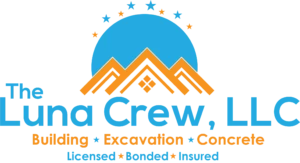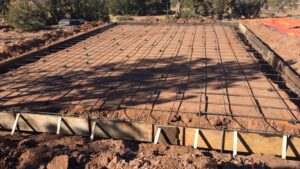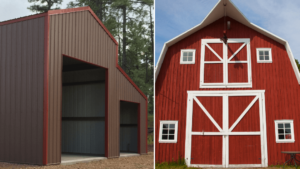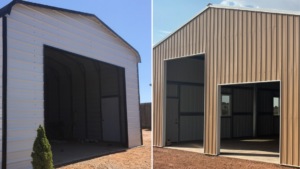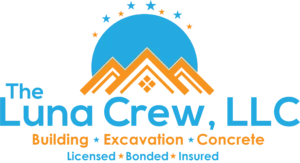Concrete leveling is a smart, cost-effective solution for homeowners and investors alike. If you’ve got a driveway, sidewalk, or foundation that’s starting to show its age, leveling can save you time and money compared to full replacement. As licensed contractors specializing in concrete foundations and metal buildings, we’ve seen the impact a well-leveled slab can have on both property value and structural integrity. In this article, we’ll break down everything you need to know about concrete leveling costs in 2024, including factors that influence pricing, methods to consider, and tips to save money on your next project.
What is Concrete Leveling?
Concrete leveling is the process of raising and re-aligning sunken or uneven concrete surfaces. Whether it’s a patio, driveway, or even your foundation, leveling can restore the surface without the need for expensive demolition and replacement.
Concrete Leveling vs. Replacement
One of the biggest questions we get is: Should I level my concrete, or just replace it? The answer depends on the condition of your concrete. If the slab is in decent shape and just needs a little lift, leveling is almost always the better option. On the other hand, if your concrete is severely cracked, eroded, or beyond repair, replacement might be the only solution. But for many situations, leveling can extend the life of your concrete for years at a fraction of the cost of replacement.
Factors That Affect Leveling Costs in 2024
Several key factors will determine how much you’ll pay for concrete leveling. Let’s break them down so you can budget accordingly.
Size of the Area Needing Leveling
The size of the area is one of the most straightforward cost factors. Larger surfaces cost more to level than smaller ones. Most contractors will charge by square footage, so the bigger the project, the higher the cost. For example, a small patio may run you around $500 – $1500, while a larger driveway or foundation could cost several thousand dollars.
Type of Concrete Leveling Method
There are a few different methods used for concrete leveling, each with its price range:
- Slab Jacking: This traditional method involves pumping a mixture of sand, cement, and water under the slab to lift it. It’s relatively affordable, but not always the most durable.
- Polyurethane Foam Injection: A newer, more durable option, polyurethane foam leveling involves injecting high-density foam under the slab. It’s fast, effective, and long-lasting, but costs a bit more.
- Mudjacking: Similar to slab jacking but using a heavier mixture, mudjacking is cost-effective but may not be ideal for every job, especially if the soil beneath the slab is unstable.
Condition of the Concrete
If your concrete is heavily cracked, eroded, or sinking in multiple spots, leveling may not be enough. The condition of the slab will impact the overall cost because more extensive damage could require additional materials and time. Sometimes, it’s not just about lifting the slab but also repairing cracks and reinforcing weak spots.
Location and Accessibility
Where you’re located plays a role in pricing. For example, urban areas tend to have higher labor costs than rural ones. Additionally, if the slab you need to level is in a hard-to-reach area (think tight spaces or uneven terrain), the job may require more specialized equipment, which can increase costs.
Average Concrete Leveling Costs in 2024
So, how much can you expect to pay for concrete leveling in 2024? On average, comparison prices from competitors, you’re looking at:
- Slab Jacking: $3 to $6 per square foot
- Polyurethane Foam Injection: $5 to $25 per square foot
- Mudjacking: $2 to $5 per square foot
For a typical residential driveway or patio, this means your total cost could range from a few hundred to a few thousand dollars, depending on the size and method used.
Labor and Material Costs
Labor rates vary depending on where you live, but expect around 50% of the total cost to go towards labor. Material costs, especially for polyurethane foam, can be higher in 2024 due to inflation and supply chain issues, so keep that in mind when getting quotes.
Tips for Reducing Leveling Costs
If you’re looking to save money on your concrete leveling project, here are a few tips that might help.
Get Multiple Quotes
One of the best ways to save is by getting quotes from several contractors. Prices can vary significantly, so take the time to compare. Just make sure you’re comparing apples to apples—some contractors may offer a lower price but use cheaper, less durable materials.
Consider DIY for Small Areas
If you’re dealing with a small section, like a sidewalk or a small patio, you might be able to handle it yourself. You can rent equipment and purchase the necessary materials for a fraction of the cost of hiring a pro. That said, it’s a tricky job, and if done wrong, it could end up costing you more in the long run.
Plan for Off-Season Work
Contractors tend to be less busy during certain times of the year, especially in colder climates. Scheduling your project during the off-season could save you on labor costs, as contractors might be willing to offer a discount to keep their teams busy.
Combine Projects
If you have multiple areas that need leveling or other repair work, consider bundling those jobs together. Contractors may give you a better rate when they can tackle multiple projects at once.
Long-Term Savings from Concrete Leveling
One of the biggest benefits of concrete leveling is the long-term savings it provides.
Preventing Structural Damage
Uneven concrete can lead to bigger issues down the line, especially when it comes to foundations. Leveling now could prevent costly repairs later on. We’ve worked on several projects where early intervention saved the homeowner thousands of dollars in future repairs.
Increased Property Value
For investors and homeowners alike, maintaining even, well-leveled concrete can boost property value. It’s a small investment with a big payoff, especially if you’re planning to sell or rent out the property in the near future.
When to Hire a Professional for Concrete Leveling
While DIY can work for small, easy-to-access areas, there are times when it’s best to call in the pros.
Signs You Need a Pro
- The area needing leveling is large
- There are significant cracks or damage
- The concrete is part of your foundation or other critical structure
Why Hire a Licensed Contractor?
Working with a licensed contractor ensures you get quality materials, proper installation, and a warranty on the work. Plus, we have the right equipment and experience to handle even the trickiest jobs.
Conclusion
Concrete leveling is a smart investment, whether you’re a new homebuilder or an experienced investor. In 2024, leveling costs vary depending on the size of your project, the method you choose, and the condition of your concrete. By staying informed and making the right decisions, you can save both time and money—and keep your property in top shape for years to come. If you’re ready to get started or really don’t know where to start, don’t hesitate to reach out for a professional quote! We’re here to help with all your concrete leveling needs.
